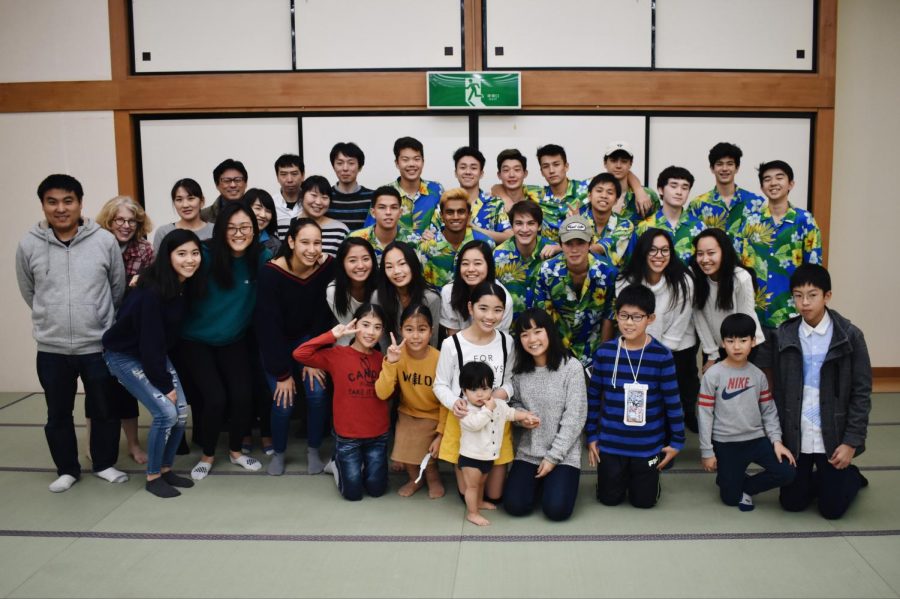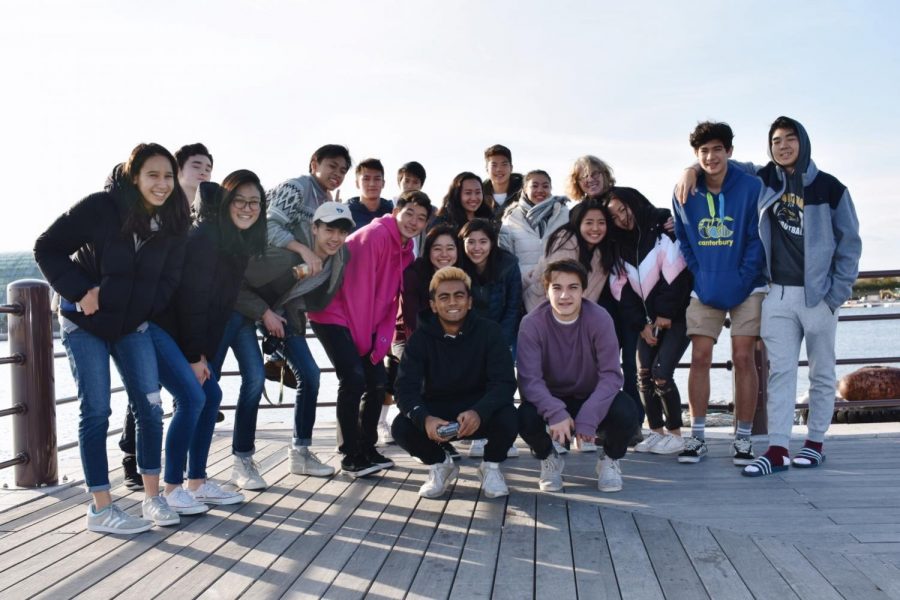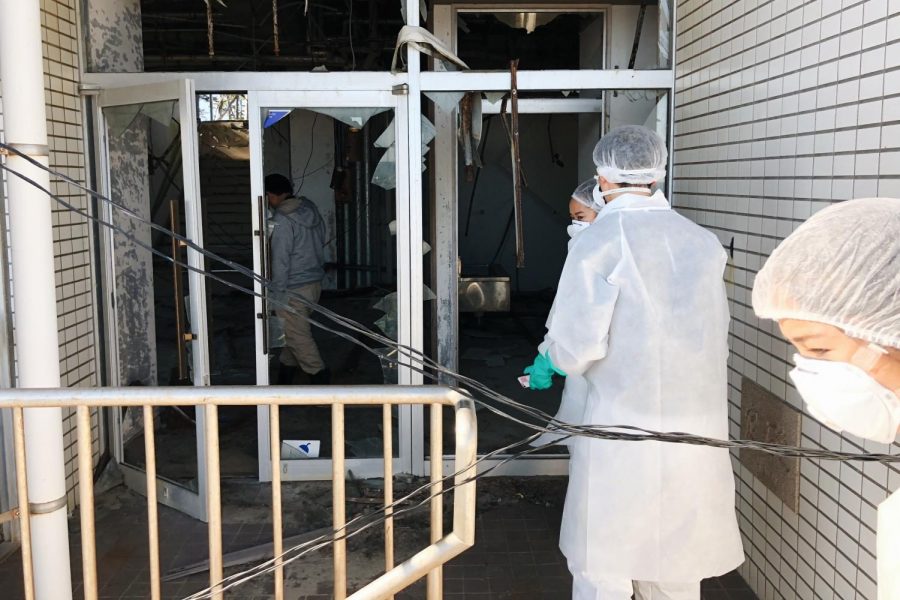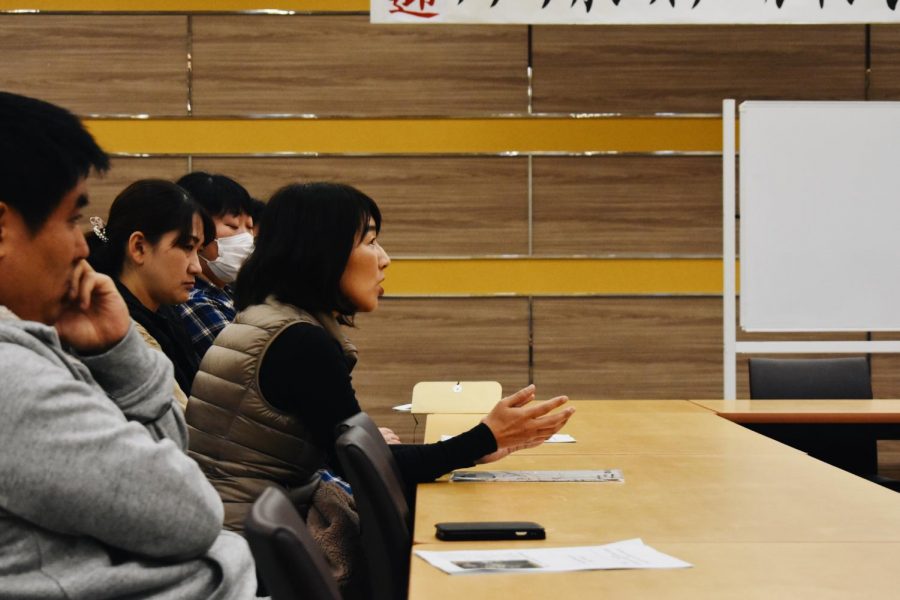English Circle, a high school service club that teaches English to children involed in the 3/11 disaster, travel to the Tohoku region during Explorations Week in November 2018.
English Circle Visits Fukushima
On March 11, 2011, northeastern Japan was devastated by an earthquake, tsunami, and nuclear meltdowns. Many citizens of Fukushima Prefecture were forcibly evacuated while many others chose to leave. Their homes and towns were uninhabitable due to the radiation that was released when the three reactors of Fukushima Daiichi––one of Japan’s 54 nuclear power plants at the time––exploded. The following year at ASIJ, English Circle, a school-run club, was started to teach English to kids whose families had been displaced by the triple disaster. Since the creation of the club, what was initially a three-times-a-month congregation of ASIJ high school volunteers with parents and children suffering from PTSD has now become a routine reunion of friends. The kids come, some from three hours away, excited to see the volunteers and play games at the Early Learning Center in downtown Tokyo, while the volunteers are equally excited to see the kids.
With every passing year, the memory of 3/11 fades as new fun English lessons and games are created. But it is still important to recognize why English Circle exists in the first place. With this in mind, Ms. Krauth and the leaders of English Circle recently took a trip to Fukushima Prefecture, home to the affected families, prior to their evacuation. After just over a month of planning and little idea of what to expect, Ms. Krauth, Mr. Bell, and 21 EC volunteers packed their bags and headed to Iwaki. After a three-hour train ride––the same train many of the families take to EC on Saturday mornings––we arrived at Iwaki station and boarded a bus to begin a trip none of us could anticipate.
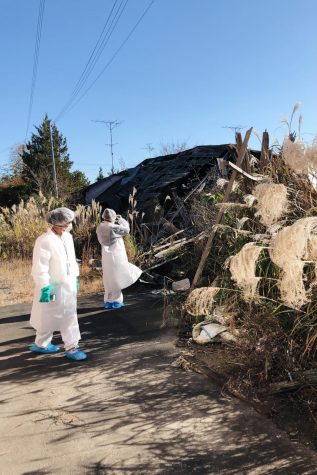 When asked to reflect, many volunteers said the most memorable part of the trip was visiting Futaba. Essentially a ghost town, Futaba had been completely evacuated and is predicted to be uninhabitable for the next several decades, despite what the Japanese government has told the press. Our first stop: the house of one of our students’ grandmothers. The volunteers’ gasps were audible as each of us filed through a small door into what can only be described as chaos. The bookshelves, refrigerator, mirrors, and picture frames were all toppled over, and dirt and debris carpeted the floor. On the wall was a calendar displaying the days of March, 2011. On the floor of a tatami room, a table that would have stood only a foot above the ground with thick wooden legs lay flat like a bug crushed by a passerby. But the most unbelievable aspect of the house was that it had been untouched since the day.
When asked to reflect, many volunteers said the most memorable part of the trip was visiting Futaba. Essentially a ghost town, Futaba had been completely evacuated and is predicted to be uninhabitable for the next several decades, despite what the Japanese government has told the press. Our first stop: the house of one of our students’ grandmothers. The volunteers’ gasps were audible as each of us filed through a small door into what can only be described as chaos. The bookshelves, refrigerator, mirrors, and picture frames were all toppled over, and dirt and debris carpeted the floor. On the wall was a calendar displaying the days of March, 2011. On the floor of a tatami room, a table that would have stood only a foot above the ground with thick wooden legs lay flat like a bug crushed by a passerby. But the most unbelievable aspect of the house was that it had been untouched since the day.
We then boarded the bus and drove to a beach, accompanied by an EC parent who had grown up playing by the waterfront and always imagined his daughters would do the same. There, an abandoned hotel barely stood, the first two floors blown away by the 8-meter tsunami that hit the coast of Futaba only an hour after the initial tremor. The parent told us about a friend of his who had run to the third floor, right where we stood, and barely survived the wave while watching it come in and obliterate what stood beneath him. Seven years later, we had a breathtaking view of glistening water so contaminated by the nuclear waste from the “Fukushima Daiichi” power plant only a few kilometers away that no one would ever swim there again.

The images we saw on our trip into town were haunting; however, the real change in perspective for many EC volunteers happened during parent interviews. While half of the volunteers set up for their normal EC-style lessons in one room, the other half prepared for a discussion that would fundamentally redefine the meaning of the club to them. After dropping off their children in the room next door, the EC parents kindly delved into their personal experiences regarding the 3/11 disaster. While we had heard many devastating stories about the day, hearing the fear, anger, and heartbreak of the kids we knew so well left the volunteers in utter disbelief. During a debrief between the volunteers that night, after stories were passed along and tears were shed, it was clear we had all learned why the club existed in the first place. A final comment from one of the parents in the interview summed it up perfectly: while the parents in one room told their tales of terror and trauma, they could hear their kids shrieking with laughter in the room next door.
As a high school student, volunteer work can seem trivial in the grand scheme of things. We often see our contributions as minor and ineffective, but this trip was a true testament to the ripple effect. At EC, it is not our job to talk to the kids about their memories of 3/11, or provide help we are not qualified to give. It is our job to make sure that we remember that 3/11 is not over for the residents of Futaba, Iwaki, and Fukushima Prefecture. It is our job to remind people that while anticipation for the upcoming 2020 Olympics in Tokyo builds, we know there is still much work to be done in rebuilding Fukushima. And it is our job to continue to make EC a place the families look forward to coming to each Saturday.
When asked about what EC meant to them, the parents described it as a safe haven from the emotional stresses that came with the triple-disaster. A place where they could finally take a breath and not worry about their kids. A place where they could talk to other parents in the same unique situation as their own. A place where, regardless of what had happened or what was going to happen, they knew their kids were laughing and experiencing their childhood.
